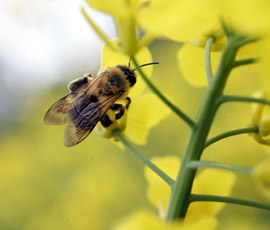MPs call for neonicotinoid ban to protect bees

A cross-party committee of MPs has urged DEFRA to suspend the use of three neonicotinoid pesticides linked to the decline of bees.
The parliament’s green watchdog, the Environment Audit Committee (EAC) urged the government to introduce a precautionary moratorium on the use of imidacloprid, clothianidin and thiamethoxam on flowering crops attractive to bees, such as oilseed rape, maize and sunflowers.
The European Food Safety Authority (EFSA), the EU food safety watchdog, published a report in January, which concluded that scientists had a identified a “serious risks” posed by neonicotinoids to bees.
Following publication of the report, the European Commission called for an EU-wide two-year ban on all use of neonicotinoid products in crops considered dangerous to bee health.
Last month, an EU vote to suspend the use of neonicotinoids failed to gain enough support. Italy, Spain, the Netherlands and Poland voted for a ban, while the UK and Germany abstained.
DEFRA is opposed to plans to restrict the use of neonicotinoids, insisting more scientific evidence of their danger is needed.
However, Labour MP Joan Walley, chairman of the EAC, accused DEFRA of taking an “extraordinarily complacent” approach to protecting bees given the vital free service that pollinators provide to our economy.
“We believe that the weight of scientific evidence now warrants precautionary action, so we are calling for a moratorium on pesticides linked to bee decline to be introduced by 1 January 2014,” said Ms Walley.
“This allows farmers to use treated seeds that have already been purchased for this growing season and gives DEFRA time to implement EU legislation on the sustainable use of pesticides.”
In the EAC report, published on Friday (5 April), Ms Walley accused agrochemical companies of failing to publish their own research and safety studies on neonicotinoids and said they “hide behind commercial sensitivity”.
“More research is needed to monitor pollinator populations and establish the impact that particular pesticides are having, but DEFRA must not use this as an excuse to avoid urgent precautionary action,” she added.
In response, Syngenta, which manufactures thiamethoxam, said it was “disappointed” that the report failed to reflect essential evidence from a range of field trials that showed “no adverse impact on bee populations from neonicotinoid use”.
Luke Gibbs, spokesman for Syngenta UK, said: “The easy option is to call for a ban on neonicotinoids in the hope that it will improve bee health. The long-term, real world, scientific reality is that a ban wouldn’t save a single hive, but it would create significant environmental, agronomic and economic challenges.”
Bayer CropScience, said it strongly disagreed with the committee’s recommendation for a moratorium on the use of imidacloprid and clothianidin.
The company added it remained convinced that neonicotinoids were safe and effective when used as directed on the product label.
“The real problems with bee health are habitat loss, viruses and parasites,” said a Bayer spokesman.
The company said the EAC had ignored a report recently published by the Food and Environment Research Agency (FERA), which concluded “the risk to bee populations from neonicotinoids, as they are currently used, is low”.
A DEFRA spokesman said: “We are doing a lot to safeguard bee health, such as the Healthy Bees Plan for honeybees, work on habitats and support for bee-friendly farming through agri-environment schemes and research funding.
“Decisions on neonicotinoids must be based on sound scientific evidence. That’s why we want the European Commission to agree to our suggestion for a major new field study to get the best, most up-to-date evidence.
“That will allow informed decision-making, rather than rushing into a knee-jerk ban based on inconclusive studies.”
But the Soil Association said the report was “another nail in the coffin of the government’s position not to support the ban on neonicotinoid pesticides”.
Farm industry fights back over neonicotinoid ‘threat to bees’

